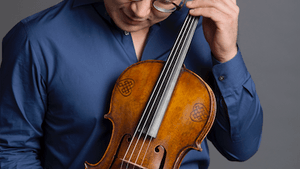Stay in the Loop
BSR publishes on a weekly schedule, with an email newsletter every Wednesday and Thursday morning. There’s no paywall, and subscribing is always free.
Berlioz and Ravel on the move
Week three of the Philadelphia Orchestra's Paris Festival

The word walkabout may make us think of Australian coming-of-age tales, but the term took on new meaning last weekend. Choong-Jin Chang, the Philadelphia Orchestra’s principal violist, circumnavigated the stage at Verizon Hall in a spirited rendition of Harold in Italy, Berlioz’s quasi-viola concerto. The concert was the third in the orchestra’s Paris Festival series.
Out and about
Harold in Italy is a four-movement Romantic-era symphony with solo viola. It was inspired by the long poem Childe Harold’s Pilgrimage, by early-19th-century poet George Gordon, better known as Lord Byron. In their musical expression, Harold’s adventures are less salacious than Byron’s own, providing a tantalizing listening experience that sizzles with heroic feeling and sensual orchestral colors interspersed with patches of ennui. The unique depth, warmth, and sonority of the viola are seldom showcased on the concert stage to such advantage.
As the musical Harold wanders through the Italian Alps, joins a pilgrimage, and warbles in the hills, Chang moves about the stage from music stand to music stand, starting in the back, moving to the front, across the stage, to the right, to the back, and eventually out the door, where he is joined offstage by three other string players for a lovely quartet. All this was at first rather confusing, but it worked as a visual aid to a piece that may not always fully engage listeners’ attention.
Harold starts with a primeval melody creeping along the low notes of basses and cellos, then turned upward by woodwinds into the roar of a full orchestra. The viola then enters, half mournful, half eager. Chang’s playing, so familiar to local audiences, is distinctively throaty and mellow but also ear-catching, a powerful force both against and in concord with the full orchestra. This is the viola as it was meant to be played. Under music director Yannick Nézet-Séguin, the orchestra is full of crisp retorts, even when the theme begins to sound a bit like “Bringing in the Sheaves.”
The second movement, as suggested by subtle modal writing, brings us the image of pilgrims (ostensibly in velvet shoes) tiptoeing through a valley to a church. There are some monotonous stretches here and in the third movement (in the score, not the performance), but Chang’s viola sings true and clear. Especially noteworthy was the memorable English horn solo by Elizabeth Masoudnia.
I found it interesting to hear Chang from so many different physical vantage points, that luxurious tone never unsure or uneven. And what a startling effect near the end of the fourth movement when, after an eternity without the soloist, the string quartet echoes offstage (Choong is joined here by violinists Richard Amoroso and Ghislaine Fleischmann and cellist Derek Barnes). I am looking forward to hearing a repeat when WRTI broadcasts the concert later this season.
Conducting electricity
Following intermission, the spotlight fell once again on Nézet-Séguin as he seemed to spin this exciting music out of some internal generator, electrifying the orchestra. The three Ravels were the zesty Alborada del Gracioso, complete with castanets; the Rapsodie Espagnole, a kind of symphony in four joyful movements; and the ever-popular Bolero, reminding us that the soul of Paris is not so far from the heart of Spain.
What a joy to watch him conduct, a dynamo of enthusiasm and passion for music, leading, cajoling, exulting. This, too, adds to the visual delight of these concerts.
Of the three, the Rapsodie is the largest work in concept and execution, with some deliriously luscious music in the same family of tropical fantasies as Ibert’s Ports of Call, composed more than a dozen years later. Bolero rises from a simple tune on the flute with a wisp of snare drum, gains in momentum as it travels around the orchestra (there’s that walkabout theme again), and explodes in a final shout-out of orchestral might. On a dreary winter day, when the world seems so inhospitable and grey, this is turmeric in your tea and the crackle of a warm fire.
What, When, Where
Paris Festival: Week Three. Choong-jin Chang, violist. Yannick Nézet-Séguin, conductor. Berlioz, Harold in Italy, Op. 16; Ravel, Alborada del Gracioso; Ravel, Rapsodie Espagnole; Ravel, Bolero. January 26-27, 2017, at the Kimmel Center's Verizon Hall, 300 S. Broad Street, Philadelphia. (215) 893-1999 or philorch.org.
Sign up for our newsletter
All of the week's new articles, all in one place. Sign up for the free weekly BSR newsletters, and don't miss a conversation.

 Linda Holt
Linda Holt